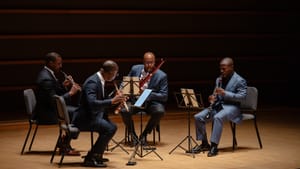Stay in the Loop
BSR publishes on a weekly schedule, with an email newsletter every Wednesday and Thursday morning. There’s no paywall, and subscribing is always free.
Celebrating Black excellence in classical music
The Philadelphia Chamber Music Society presents The Principal Brothers concert series

On April 16, a quartet made up of flutist Demarre McGill, oboist Titus Underwood, clarinetist Anthony McGill, and bassoonist Bryan Young made its Philly debut at the Kimmel Center, performing works honoring the musicians' leadership and excellence as principal players in four of the country’s major orchestras. The program (promoted as part of concert series dubbed "The Principal Brothers"), hosted by the Philadelphia Chamber Music Society (PCMS), emphasized breaking boundaries, whether among races, genres, or even between audience and performer.
The birth of Principal Brothers
In 2020, with the pandemic in full swing and protests over the murder of George Floyd exposing fissures in American society, Underwood received an unexpected message in his Facebook inbox. It was from composer James Lee III, who asked Underwood to try out something he’d recently written for him. The McGill brothers and Young received similar messages.
In a moment of isolation and tension, Lee had spent a week writing music to honor the progress of his friends in the orchestral world: four Black wind players at the top of their game, principals in major American orchestras. When Underwood first read through the piece, he recognized a good kind of challenge. “This is hard!!” he wrote back to Lee. Five years later, Lee’s Principal Brothers, a collection of short works for solo clarinet, flute, oboe, and bassoon, made its debut in Philadelphia.
A night of notable new wind works
The short concert, roughly 75 minutes without intermission, reminded me that hearing music live can be categorically different than listening at home. The concert took place in the Perelman Theater, the Kimmel Center’s gorgeous, wood-wrapped chamber space. Demarre McGill, on flute, kicked off with Principal Brother I. Despite flights of virtuosity, what most impressed me about McGill’s playing were his soft landings—decrescendos into silence, making the quiet of the hall a character unto itself.
The other three Principal Brothers works were sprinkled across the program, each designed to honor its unique performer. For example, each piece began, somewhat cheekily, with notes representative of the performer’s name—D for Demarre, B (solfege “ti”) for Titus, A for Anthony, and B-flat for Bryan—and featured a rhythmic figure meant as an utterance of that performer’s name. The movements also leaned into the aptitudes of each instrument and explored their expressive ranges, whether that meant lively bass staccato for the bassoon, vibrating double-tongued figures for the flute, or burbling, aquatic runs for the clarinet. Musical humor laced through all the movements, eliciting appreciative chuckles from the audience.
The program also featured works for combinations of winds by Brazilian composer Heitor Villa-Lobos, American contemporary composer Valerie Coleman, and Belize-born British composer Errollyn Wallen. A special treat was that two of the night’s four composers—Lee and Wallen—were in attendance and gave short remarks about their pieces.
Energy, guts, and synthesis
There was palpable energy, a tautness, to the whole evening. Underwood, in remarks after the concert, may have hit on why when he spoke to the experience of getting to “talk back with composers.” Notably, except for the work by Villa-Lobos, all of the pieces performed were written in the last 15 years, and Wallen’s piece, Everything is Curved (a PCMS commission), got its world premiere. This is refreshing for a classical music program, given the genre’s centuries-old canon.
There was a sense of creating something new, but without burning down what came before. Wallen’s Everything is Curved, for example, riffed on traditional classical forms like the chorale and the sarabande, yet also had a movement marked “gutsy”, which the performers later described as “on fire”. Wallen herself spoke of embracing simplicity, but, in the words of Underwood, the piece still managed to take the performers “into a whole new space.”
Across the program, the music reflected this kind of syncretic approach, drawing on abstract classical forms like fugal writing, but also on Latin and jazz traditions, and adding meta-commentary on the music in the form of playful slides and wobbles, like smirks and winks. Coleman’s Rubispheres, for example, drew inspiration from New York’s night club scene, the Washington Heights neighborhood, and Baptist revivals.
This was a friendly and yet brilliant concert, one that made me want to attend more PCMS programs in the Perelman Theater, soaking in its organic acoustics and learning from similarly thoughtful musicians.
What, When, Where
The Philadelphia Chamber Music Society presented The Principal Brothers concert series. Works by James Lee III, Heitor Villa-Lobos, Valerie Coleman, and Errollyn Wallen. Demarre McGill, flute; Titus Underwood, oboe; Anthony McGill, clarinet; and Bryan Young, bassoon. Philadelphia Chamber Music Society. April 16, 2025 at the Kimmel Center’s Perelman Theater, 300 S. Broad Street, Philadelphia. (215) 569-8080 or PCMSconcerts.org.
Accessibility
The Perelman Theater is a wheelchair-accessible venue. For more info, visit Ensemble Arts Philly's accessibility page.
Sign up for our newsletter
All of the week's new articles, all in one place. Sign up for the free weekly BSR newsletters, and don't miss a conversation.

 Lowry Yankwich
Lowry Yankwich